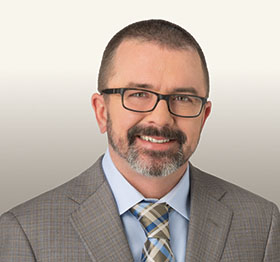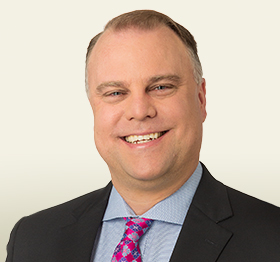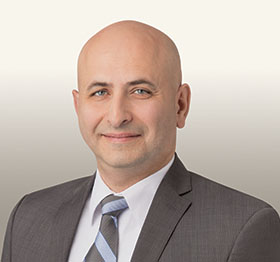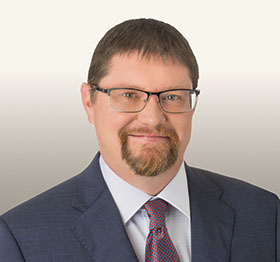Medical Oncology & Hematology
Using the most advanced treatments available in medical oncology and hematology, we treat patients with all types of cancer and blood diseases.

Meet the Team

Anthony J. Jaslowski, MD, FACP
Medical Oncology and Hematology

Brian L. Burnette, MD
Hematology, Medical Oncology, Internal Medicine

David L. Groteluschen, MD
Medical Oncology, Internal Medicine

Edgard Badine, MBA, MD
Medical Oncology and Hematology

Evan Wenig, DO
Medical Oncology and Hematology

Harsha Poola, MD
Medical Oncology, Hematology and Internal Medicine

Matthew L. Ryan, MD
Hematology, Medical Oncology, Internal Medicine

Stephanie Pritzl, MD
Medical Oncology and Hematology
Whether you’ve been diagnosed with cancer, have uncertain symptoms or have reason to suspect you may have cancer, our team is here with evidence-based, personalized care that’s backed by experience, compassion, and the latest advances in cancer treatment.
In addition to treating today’s patients, our providers are deeply involved in clinical research. Through participation in national clinical trials, we’re helping advance cancer treatment for the future. It’s not enough to improve care for the patient in front of us; we’re working to improve care for the patients we haven’t met yet.
Medical Oncology
The focus of medical oncology is on systemic therapies—medications that travel throughout the body to find and treat cancer wherever it may be. These include chemotherapy, immunotherapy, hormone therapy and targeted therapy. Each one can help stop the growth of cancer cells, shrink tumors, prevent the spread of cancer or eliminate it altogether. Our medical oncologists can also help manage the symptoms of cancer and its treatment such as pain, fatigue and nausea.
Medical oncologists are often the “quarterbacks” of your cancer care team, working closely with radiation oncologists, surgeons, pathologists, genetic counselors and other specialists to deliver personalized, coordinated care.
Hematology
Hematology focuses on treatment of blood-related conditions, including both cancerous diseases like leukemia, lymphoma and multiple myeloma, and non-cancerous disorders like anemia, clotting disorders, or low platelet counts. Our hematologists are specially trained to diagnose and manage these complex conditions using advanced lab testing and individualized treatment plans.
Cancer Therapy Services
Chemotherapy is a treatment that uses drugs to destroy cancer cells. It is often called simply “chemo.”
Chemotherapy is used to:
- Destroy cancer cells
- Stop cancer cells from spreading
- Slow the growth of cancer cells
Chemotherapy can be given alone or with other treatments. It can help other treatments work better. A patient may get chemotherapy before or after surgery or radiation therapy.
Different chemo drugs are used to treat different cancers. The drugs go through the whole body to kill the cancer cells. Usually, more than one chemo drug is used for a patient so the drugs can work together to kill more cancer cells. This is called combination chemotherapy.
Chemotherapy can be given in these forms:
- An IV (intravenously)
- A shot (injection) into a muscle or other part of the body
- A pill or a liquid that is swallowed
- A cream that is rubbed on the skin
If your prescribed chemo is a pill or liquid, it can often be taken it at home, according to doctor’s directions. Chemo shots are given in a hospital, clinic or at home. But most often, chemo is given into the veins through a needle or tiny plastic tube called a catheter. This is called IV (intravenous) chemo. At St. Vincent Hospital Cancer Centers, IV chemo can be administered in a private, semi-private or general infusion area—whatever is most comfortable for you.
You may get chemo once a day, once a week, or even once a month. It depends on the type of cancer and chemo. The length of time also depends on how your body responds to the drugs. The treatment period is followed by a period of rest allowing the body a chance to build healthy new cells.
Hormone therapy for cancer – also called endocrine therapy – alters the body’s hormones to help control or cure cancer. Hormone therapy, which can be done with medications or surgery, is most frequently used to treat breast and prostate cancer. The type of hormone therapy a person receives depends upon:
- Type and size of the tumor
- Age of the person
- Presence of hormone receptors on the tumor
- Other factors
Most often used along with or after another type of treatment to boost its effects.
Today, biotherapy plays a fairly small role in treating most cancers. It seems to work best when treating smaller, early stage cancers, and may be less helpful for more advanced disease. Its main role at this time is making other forms of treatment better, but newer treatments are being tested that may have a greater impact on the outlook for people with cancer in the future.
Targeted therapy is a new type of cancer treatment that uses drugs or other substances to identify and attack cancer cells while doing little damage to normal cells. Targeted therapies:
- Attack the cancer cells' inner workings – the programming that makes them different from normal, healthy cells
- Alter the way a cancer cell grows, divides, repairs itself, or interacts with other cells
- A major focus of cancer research today